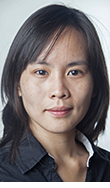Teacher ‘making’ workshop aids study, promotes STEM education

Sharon Chu

Francis Quek
Other articles on Texas A&M’s making research and programs:
Viz prof heads NSF study leading youth to STEM careers
Children create STEM related items in NSF funded study
Study eyes how STEM activities influence kids
[Viz profs heading STEM study in two colonias schools] (http://one.arch.tamu.edu/news/2016/12/7/quek-colonias-study/)
Local elementary school teachers are stocking up on hardware supplies and brainstorming new lesson plans after learning basic programming, electronics and 3-D printing at a three-day workshop hosted June 12–14 by Texas A&M Department of Visualization faculty.
“The things that I can afford out of my pocket, I’ll do immediately,” said Donna Randazzo, a science teacher at Calvert Elementary School. “We’re not going to wait another year to start teaching this.”
In the workshop, faculty taught 20 eager educators the basics of the “maker movement,” a recent phenomenon that encourages people of any age or technical proficiency to explore engineering-oriented activities like prototyping and invention. The teachers learned how making can be used to better teach science, technology, engineering and math concepts.
The workshop is part of multi-year, grant-funded research headed by visualization faculty Francis Quek and Sharon Chu, who believe that making, through hands-on exploration and invention, better engages children and will result in more interest in scientific career fields and increased self-confidence.
“Our philosophy is based on constructionism, the fact that doing things with your hands helps you to learn better than just sitting and listening to teachers,” said Chu, who led the workshop, which involved fabricating fun motorized projects like robots from household items like plastic cups and popsicle sticks. “Making has been around forever, but we’re introducing technology because that is what we see as being important for the future. We’re training students to be workers for the future.”
The team has been running a project for two years at an elementary school in Bryan using making to supplement the curriculum and yielding positive results.
“At the school we saw a significant correlation between making and their interest in science,” said Quek. “Participants’ test scores rose significantly in the first year of involvement and more students said they want to become engineers and scientists.”
For the teacher workshop, aimed at expanding making education to more schools, Quek and Chu used an education reinvestment seed grant from the Texas A&M College of Education and Human Development.
We don’t know how to train a maker teacher or what he or she looks like,” Quek said. “We are getting feedback from them to see how this might fit in their school and what kind of education they would need.”
Quek said he believes there is a window of opportunity to interest children in science and if they aren’t engaged, they may never excel at it.
“Children start pursuing passions and interests in the third to fifth grade,” Quek said. “If children do not think of themselves as possible scientists, they will not apply themselves in that area. Introducing making allows them to establish this possibility.”
Teachers in the workshop said they believe introducing making to their lesson plans will grow students interest in the subjects they teach.
“In the third grade, we talk about electrical engineering in theory but don’t show any of it. It wasn’t in my curriculum,” said Krissy Wallace, a math and science teacher at Southwood Valley Elementary School in College Station. “Having them make circuits is a better way to teach that and I’m going to change my curriculum to include it.”
Wallace said she and another Southwood teacher are also planning to create boxes filled with making supplies for each of the school’s science teachers.
Another teacher said “it will be like Christmas” for her students when she starts bringing out making projects and that “they’ll think they’ve gone to heaven.”
Chu sent the teachers back with lesson plans and digital materials to help them get started and will monitor their progress throughout the upcoming school year.
Results of the workshop study, Quek said, will be included into a National Science Foundation proposal to expand the pilot program and present more schools, students and teachers with making as a better way to learn.
Other faculty involved in the NSF study include Patricia Larke and Lynn Burlbaw from the Department of Teaching, Learning and Culture, and Rebecca Schlegel, associate professor of psychology, from the College of Liberal Arts.
Sarah Wilson
swilson@arch.tamu.edu
Tags
- applied creativity
- archone gallery
- building a better texas
- coa gallery
- outreach
- partnerships
- research
- rss
- technology
- visualization
- viz gallery
Related Posts

Initiative fusing arts, technology education gains momentum

Micro-manufacturing initiative earns NSF Convergence Award

Agencies work to illuminate climate change in Texas
Follow Us
Facebook Twitter Vimeo Youtube Flickr RSS
Recent Posts

Planning prof heads study of disaster housing aid

A message from the dean

Former student remembered as expert planner

Leading educator named new head of Architecture Dept.













_thumbnail_small.png)
